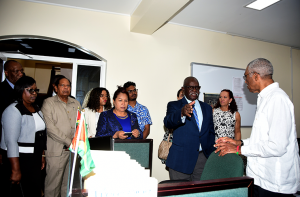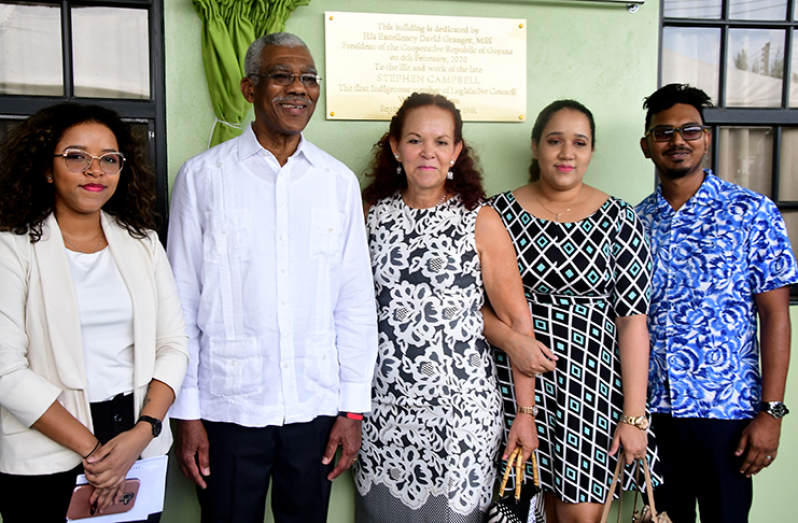– President David Granger
THE government is examining options for the introduction of a single national identification card with biometric and security features which can be used for all government transactions.
This is according to President David during his feature address at the opening of the Stephen Campbell House, Shiv Chanderpaul Drive, Bourda, Georgetown on Thursday.
The Department of Citizenship now has its own building. This building was renovated in order to become a comfortable and people-friendly environment.
In attendance were ministers of government, permanent secretaries, Campbell’s granddaughter, Anna Correia Bevaun and his great-granddaughter, Naiomi Bevaun, along with special invitees.
The President noted that such an ID card can be used for the collection of NIS pensions, payment of taxes, social security, immigration and admission to schools.
“This single national identification card will replace the multiple forms of identification which are used presently by citizens,” the President noted.
Meanwhile, the President said the Stephen Campbell House will stand as a testimonial of the nation’s commitment to protecting the rights of every citizen regardless of race, religion or region of residence in accordance with the Constitution.
The building currently houses the Department of Citizenship.
The President said the department exemplified the importance which the government attaches to protecting Guyanese citizenship and to prevent abuses which have been occurring with increasing frequency in other parts of the hemisphere.
Underscoring that citizenship of a state is a precious asset and must be managed carefully, President Granger said the United Nations Universal Declaration of Human Rights [at Article 15] provides that: “Everyone has the right to a nationality.”
“Citizenship is not perfunctory. It carries benefits and entitlements. It is estimated that there are more than 10 million stateless persons in the world,” the President noted.
President Granger said that Guyanese citizens enjoy constitutional protections and entitlements.
He said that citizenship entitles a citizen to have his or her birth registered which, in turn, can be used to register to vote and to apply for a national identification card and a passport.
“Proof of nationality allows for citizens to access education and to receive social assistance and public pensions,” the President noted.
He explained that citizenship entitles every Guyanese to a share in the country’s patrimony.
“Citizenship obligates the state to protect its citizens, both at home and abroad. The protections offered by citizenship are not limited to the country’s territory. Nationals are entitled to protections outside of our borders. The Constitution [at Article 31] states: “It is the duty of the State to protect the just rights and interests of citizens resident abroad,” the President underscored.
Further, he said that Guyanese are entitled to certain benefits by virtue of their country’s membership of the Caribbean Single Market and Economy.
He explained that these include duty-free movement of goods produced within the community, definite six-month entry in any community state and the free movement of certain categories of skills and labour, including university graduates, sportspersons, artists, media workers, registered nurses, trained teachers and certain artisans and household domestics.
NOT A SYMBOL
He said citizenship is not a symbol. It is a qualification which ascribes rights, benefits and

entitlements.
The President noted that citizenship has become an issue of topical interest, as evident in the ongoing reports and debates with the media, relating to the presence of foreign nationals in Guyana and the eligibility for qualification to become a member of the National Assembly.
The Constitution, he said, empowers the President with the authority to deprive a dual citizen of his or her Guyanese citizenship.
It states (at Article 46 (1)): “If the President of Guyana is satisfied that any citizen of Guyana has at any time after 25th May 1966, acquired by registration, naturalization or any other voluntary act (other than by marriage) the citizenship of any other country other than Guyana, the President may, by order, deprive that person of his or her citizenship.”
Noting that the Department of Citizenship was intended to protect the rights of citizenship, President Granger said citizenship policy is to ensure that every Guyanese citizen will be accounted for from birth to death, as far as technologically possible.
“Citizenship is attained by registration of births. Children, nowhere in this country, should be prevented from attending school because they had no birth certificates. Many births could remain unregistered because of the long distance, time and high cost of transport associated with registration,” he noted.
He said that the Department has been decentralising the issuance of passports.
“This has relieved the burdens which many citizens, across Guyana, had to face in travelling long distances and at great expense in order to obtain a passport. Passport offices have now been established at the capital towns of New Amsterdam, East Berbice-Corentyne and Linden, Upper Demerara-Berbice, and another will soon be established in the Pomeroon-Supenaam, at Anna Regina,” the President noted.
The government intends, he said, to eventually have a passport office in every capital town so as to make the service more accessible to citizens.
He said that the department is responding to the migrant challenges. It is estimated that at present there are more than 13,000 migrants from the Bolivarian Republic of Venezuela who have entered the territory, most of whom are in on the frontier regions so far.
STRAIN
These migrants, he said are placing a strain on local social services, particularly on public health and public security systems.
“The department has adopted international best practices to respond to the influx of migrants fleeing Venezuela. It is improving its management by strengthening its capacity to monitor and map these migrants; it is seeking international help in providing them with humanitarian assistance. Guyana’s extensive and often porous land borders increase the likelihood of illegal migration and emigration, including back-tracking,” President Granger noted.
Additionally, the President said that it is fitting that the building be dedicated to Stephen Campbell, one of Guyana’s iconic Indigenous leaders. Stephen Campbell was an ardent advocate of protecting Indigenous citizenship.
“He wore many caps during his lifetime. He worked as a teacher, farmer and labourer and as a rubber-tapper. He toiled in the bauxite and gold-mining industries and in the logging industry. He is best remembered for his sterling agitation for the protection of Indigenous peoples’ rights – rights which he felt were derived from their citizenship of this country,” the President said.
A SHINING EXAMPLE
Adding that Stephen Campbell’s vision of citizenship embodied the concept of national integration, the President said this could be achieved only if each person is respected, regardless of his or her class, ethnicity or place of residence and where everyone enjoyed opportunities for economic, political and social advancement.
“‘Guyaneseness’ – the quality of being Guyanese – is to belong to a country which celebrates its cultural diversity by respecting each other,” the President noted.
Minister of Citizenship, Winston Felix, said in May 2015, the Department of Citizenship was created since there was a need to acquire space to accommodate services offered that were previously at the Public Service Ministry, Water Street, Georgetown.
He explained that the space available was inadequate and President David Granger identified the current building which was the home of the Presidential Guard Service and now the headquarters of the Department of Citizenship.
He explained that the Department of Citizenship consists of immigration and passport department located at Camp Road, Eve Leary, and the Registrar of births, deaths and marriages located above the Guyana Post Office Corporation.
Minister Felix explained that the current building will house the minister of citizenship, the immigration and support services, the administrative department along with the immigration secretariat support staff.
He noted that the remigration and diaspora unit housed in the Ministry of Foreign Affairs will also be absorbed in the ministry.
He explained that from July 2018, to date, the ministry has processed 15,249 applications of various categories and from the oil and gas sector, 4, 054 applications were processed.
Underscoring that the name “Stephen Campbell House” is important in the history of the Indigenous peoples of Guyana, Felix said Campbell was the first Amerindian Member of Parliament in Guyana.
He was elected to the Legislative Council of British Guiana on September 10, 1957. On this date, every year, Guyana celebrates Stephen’s achievements as a part of Amerindian Heritage Month.
Stephen Joseph Campbell was born in Moruca, a sub-district of the Barima Waini region, the northern most part of Guyana, on December 26, 1897. Campbell was born to Maria dos Santos nee Osorio, and Tiburtio A. Campbell, a boat builder.
He said both parents died when he was very young and he was brought up by his grandmother whom he credited with teaching him the core principles of life; “religion and discipline”.
He was the first Amerindian to contest the General Elections in British Guiana, and at the age of 60, he became the first Amerindian Member of Parliament in Guyanese history.
The minister noted that Campbell died on May 12, 1966, two weeks before British Guiana gained Independence from Britain.




.png)









